|
|
|
Sort Order |
|
|
|
Items / Page
|
|
|
|
|
|
|
| Srl | Item |
| 1 |
ID:
179201
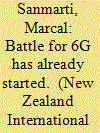

|
|
|
|
|
| Summary/Abstract |
A remarkable technology, 5G allows us not just to surf the internet faster, but also makes possible the internet of things or IoT - a network of physical objects that are embedded with sensors, software and other technologies for the purpose of connecting and exchanging data with other devices and systems over the internet. But the 5G technology will be remembered also for starting a global race to own new communication technologies, a contest that China is winning. Geopolitical rifts have led to some countries stripping Chinese-made equipment from their 5G networks. And the next battle, for 6G supremacy, has already begun.
|
|
|
|
|
|
|
|
|
|
|
|
|
|
|
|
| 2 |
ID:
129645
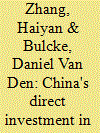

|
|
|
|
|
| Publication |
2014.
|
| Summary/Abstract |
While China is fast becoming an important outward direct investor, its companies are showing an increasing interest to locate in Europe and the European Union (EU). It has been suggested that this can partly be explained by the more lenient attitude of the European countries compared to the US, where some acquisitions were abandoned when they ran into political opposition based on security concerns. Yet, also in Europe, the media follow rather closely each new Chinese entry, and certain politicians have started to criticise the take-over of technology-oriented companies, especially by Chinese state-owned firms. Against the background of a very open foreign direct investment (FDI) policy as measured by OECD FDI Restrictiveness Index for the EU and the individual countries, an overview is given of the pre- and post-establishment obstacles to direct foreign investment. Also, the EU policy measures that directly or indirectly deal with incoming direct investment are discussed. Within the context of the EU competition policy and the merger regulation, the EU Commission has cleared five cases of take-over by Chinese state-owned enterprises. Although the Lisbon Treaty authorises the EU Commission to take charge of investment policy as part of the EU commercial policy, it will take time to realise this. If the announced negotiations about an investment treaty between China and the EU could work out the necessary balance, it would be an important step in achieving more reciprocity between their respective investment regimes.
|
|
|
|
|
|
|
|
|
|
|
|
|
|
|
|
| 3 |
ID:
129646
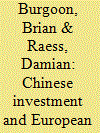

|
|
|
|
|
| Publication |
2014.
|
| Summary/Abstract |
The rapid increase in Chinese foreign direct investment (FDI) into Europe raises important questions about the implications of such for workers and organized labor in Europe: (1) does Chinese FDI flow more or less to regulated labor markets than do other investment sources?; (2) what are the strategies of works councilors and union representatives in dealing with real or expected investment from China?; and (3) how do individual workers view the propriety of Chinese FDI given China's low-wage, labor-unfriendly profile in the global economy? Quantitative and qualitative data on Chinese FDI, individual opinions about China and globalization, and on strategies of labor representatives provide some leverage to preliminarily answer these questions. First, Chinese FDI does not seem to be more (or less) focused on investing in the least regulated labor markets than other sources of FDI. Second, interviews with works councilors and union representatives in Germany, France and the Netherlands affirm a cautiously optimistic view of Chinese investors as no more or less threatening to organized labor than other investors. Third, analysis of attitudes about Chinese and European interests in managing globalization suggest that less-skilled, more vulnerable, pro-labor-union workers in Europe tend to be more rather than less enthusiastic about Chinese management than their fellow citizens. These patterns suggest a surprising, if tentative, embrace by workers and their representatives in Europe of that investment.
|
|
|
|
|
|
|
|
|
|
|
|
|
|
|
|
| 4 |
ID:
132321
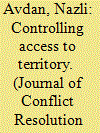

|
|
|
|
|
| Publication |
2014.
|
| Summary/Abstract |
Previous scholarship has largely failed to address the effect of economic interdependence on issue areas other than interstate conflict. This study seeks to redress this lacuna by focusing on states' visa policies and examining the impact of trade and capital interdependence in the context of transnational terrorism. The article argues that economic ties affect visa policies through a reconfiguration of preferences and the opportunity costs of economic loss and by tempering the impact of terrorism. To support this claim, the study conducts statistical analysis using directed dyad data on the visa policies of 207 states and independent political units. The article shows that the impact of economic interdependence is contingent on whether states are directly targeted in attacks of terrorism or face indirect threats from global terror. The study finds that economic incentives overwhelm security concerns when threats are indirect but have relatively limited influence, given threats against a state's own citizens or territory.
|
|
|
|
|
|
|
|
|
|
|
|
|
|
|
|
| 5 |
ID:
138687
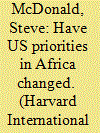

|
|
|
|
|
| Summary/Abstract |
At the end of the first ever US-Africa Leaders Summit on August 7, 2014, President Obama declared that it had been an “extraordinary event,” citing the accomplishments of the summit in terms of trade, investment, and security cooperation. Included in the latter category was a commitment to peacekeeping and the need to address corruption and bad governance in the continent.
|
|
|
|
|
|
|
|
|
|
|
|
|
|
|
|
| 6 |
ID:
174176
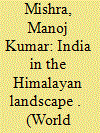

|
|
|
|
|
| Summary/Abstract |
Manoj Kumar Mishra reviews the evolution of India’s policies towards its smaller Himalayan neighbours Nepal and Bhutan. China’s rising profile in the region and growing interaction with all regional states has whetted their appetite for greater independence from Indian influence. New Delhi must be mindful of the sensitivities of the two strategically situated and landlocked former protectorates, which Beijing seeks to involve gradually in its foreign cooperation projects.
|
|
|
|
|
|
|
|
|
|
|
|
|
|
|
|
| 7 |
ID:
133903
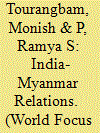

|
|
|
|
|
| Publication |
2014.
|
| Summary/Abstract |
In recent times, few other events in world politics has garnered the attention of practitioners and scholars as the relative opening of Myanmar has done, erstwhile under the iron fist rule of the military. While countries increasingly make a beeline to engage resource-rich and strategically located Myanmar, several challenges remain, both internal and external in nature. As India envisions a more comprehensive and more broad-based relationship with Myanmar in its new avatar, New Delhi has to juggle amidst challenges emerging out of Myanmar's own political dynamics in addition to India's security concerns, its economic ambitions and the strategic dimensions of an emerging balance of power game in Asia.
|
|
|
|
|
|
|
|
|
|
|
|
|
|
|
|
| 8 |
ID:
147744
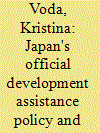

|
|
|
|
|
| Summary/Abstract |
The author analyzes changes in Japan's Official Development Assistance (ODA) policy in terms of maintaining peace and security. She describes the main theoretical approaches to analysis of Japan's development support policy; gives an overview of ODA Charters; observes Japan's efforts toward building up capabilities in the field of defense and security in order to increase Japan's contribution to global development and enhance its influence in international affairs.
|
|
|
|
|
|
|
|
|
|
|
|
|
|
|
|
| 9 |
ID:
126587
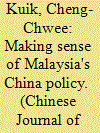

|
|
|
|
|
| Publication |
2013.
|
| Summary/Abstract |
Using Malaysia's China policy as a case study of a smaller state's response to a rising power, this article challenges the mainstream neorealist notion that the growing capability and geographical proximity of a rising power tend to induce fear among its weaker neighbours. By tracing the transformation of Malaysia's China policy, the article's findings indicate that power asymmetry and geographical proximity have no inherent logic of their own; rather, whether and to what extent the two variables will prompt smaller states to become fearful and/or attracted to a rising power is often a function of intervening factors at the domestic level, i.e. the imperative of ruling elite's domestic legitimation. In the case of Malaysia's China policy, it is the ruling Barisan Nasional elite's desire to capitalize on the big power's rise-for the ultimate goal of enhancing and justifying its political authority at home-that has driven the smaller state to adopt a hedging approach characterized by an inclination to prioritize immediate economic and diplomatic benefits over potential security concerns, while simultaneously attempting to keep its strategic options open for as long as the systemic conditions allow.
|
|
|
|
|
|
|
|
|
|
|
|
|
|
|
|
| 10 |
ID:
089911
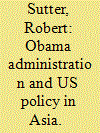

|
|
|
|
|
| Publication |
2009.
|
| Summary/Abstract |
American preoccupation with the global economic recession and conflicts in Southwest Asia and the Middle East indicated that US relations with the rest of the Asia-Pacific region were likely to be of generally secondary importance at the start of the Obama administration. In Asia, the economic crisis put a premium on close US collaboration with the major economies, China and Japan, and on avoiding egregiously selfserving economic practices that could prompt protectionism and curb world growth. Apart from the Middle East-Southwest Asian region, the other major area of US security concern in Asia was North Korea. North Korea's escalating provocations created a major international crisis in 2009 that forced the Obama government to change priorities and give top-level attention to dealing with Pyongyang. The provocations included a long range ballistic missile test, a nuclear weapons test (North Korea's second), withdrawal from the Six-Party Talks and resumption of nuclear weapons development. Longstanding US concern with the security situation in the Taiwan Straits declined as President Ma Yingjeou reversed the pro-independence agenda of his predecessor and reassured China. The Obama government seemed poised to build on and make a few needed adjustments to Bush administration policies towards regional allies and emerging powers, China and India. Early indicators suggest that enhanced US activism and flexibility in Southeast Asia may represent a significant change in US policy in Asia under an Obama administration that otherwise seems generally inclined to adhere fairly closely to pragmatic and constructive US approaches to key Asia issues in recent years.
|
|
|
|
|
|
|
|
|
|
|
|
|
|
|
|
| 11 |
ID:
128018
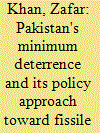

|
|
|
|
|
| Publication |
2014.
|
| Summary/Abstract |
In the immediate aftermath of nuclear weapon tests in May 1998, Pakistan opted
for a policy of minimum deterrence, which entailed that Pakistan would not need
a larger number of nuclear deterrent forces, as a small number of them would be
sufficient to deter. The concept of a minimum deterrence existed even before
Pakistan tested nuclear weapons. However, later Islamabad realized that minimum
could not be sustained as earlier conceptualized. It needed to be evolving and
dynamic. Minimum deterrence (MD) transformed into minimum credible deterrence
(MCD) which had policy implications for Pakistan's force-building structure.
Among its force building, Pakistan not only upgrades its deterrent forces, but also
builds more nuclear reactors which makes Islamabad reluctant to withdraw its
veto from the Fissile Material Cut-off Treaty (FMCT). It requires more fissile
materials in order to enhance its deterrent credibility. Why does Islamabad do
this, and if its policy approach remains consistent with the minimum deterrence it
conceptualized earlier? This article examines the rudimentary factors that increase
Pakistan's security concerns and elaborates on Pakistan's post-1998 shifting policy
approach toward fissile materials in the region's changed strategic environment.
|
|
|
|
|
|
|
|
|
|
|
|
|
|
|
|
| 12 |
ID:
118395
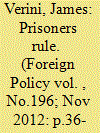

|
|
|
| 13 |
ID:
189038


|
|
|
|
|
| Summary/Abstract |
On February 24, 2022, Russian President Vladimir Putin ordered Russian troops to invade eastern Ukraine to carry out a “special military operation.” This latest war in Russia's neighborhood recalls its annexation of Crimea in 2014 and its conflict with Georgia in 2008. Many believe that Russia is seeking to establish a sphere of influence in its backyard, with a view toward restoring some of the old influence of various elements of the Soviet Union and the Russian Empire.
|
|
|
|
|
|
|
|
|
|
|
|
|
|
|
|
| 14 |
ID:
146919
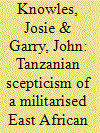

|
|
|
|
|
| Summary/Abstract |
Attitudes towards a regional military force are of paramount importance when exploring public support for regional integration. Until now, however, scholarly research has not considered the influence of attitudes towards a regional military mechanism in the sub-Saharan African context. Using Afrobarometer data, we demonstrate that military concerns are vital when exploring Tanzanian attitudes towards the proposed political federation of the East African Community (EAC), the East African Federation (EAF). More specifically, opposition to military cooperation strongly influences Tanzanian scepticism of the EAF. This finding is highly relevant given that referendums in the participating member states must be passed to facilitate political integration. Heightened opposition towards military cooperation raises the possibility of the public rejecting a politically integrated EAC. This poses a potential obstacle to the implementation of joint security policies and crucial mechanisms to provide a more stable region at large. We account for alternative explanations of Tanzanian opinion formation and reflect on the strength of military-orientated concerns for investigating public support for the East African project specifically and regional integration in sub-Saharan Africa more widely.
|
|
|
|
|
|
|
|
|
|
|
|
|
|
|
|
| 15 |
ID:
090352


|
|
|
|
|
|
|
|